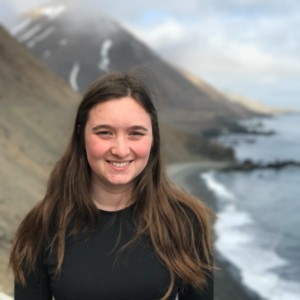Laura Biester earns Rackham award for excellence in teaching

CSE PhD student Laura Biester has received a 2022 Rackham Outstanding Graduate Student Instructor Award for her extensive work as an instructor in EECS courses and promoter of diversity in the department.
Biester taught a section of EECS 183: Elementary Programming Concepts during the Winter 2022 Semester. For the past academic year, she’s also worked as an Engineering Teaching Consultant in the Center for Research on Learning and Teaching (CRLT). There she leads learning cohorts of 20 students as part of their graduate student instructor/instructional aid training (GSI/IA), does one-on-one consultations with GSIs/IAs, and conducts midterm student feedback sessions.
For two years Biester was the primary instructor for EECS 110: Discover Computer Science, a class that aims to increase the diversity of students in CS. Students in the class worked with Biester and Prof. Rada Mihalcea to see how computers connect to real-world applications in many disciplines. The class teaches core computer science concepts, programming basics, and gives hands-on experience in several computer science areas. She also contributed to the Explore Computer Science Research initiative that gives cohorts of undergraduate from historically underrepresented groups exposure to research and the career opportunities that come with it.
Previously, Biester earned a CSE Service Award in Climate, Diversity, Equity, and Inclusion for her commitment to increasing the number of women and other underrepresented minorities in CSE.
“With her innovative teaching methods,” her award letter said, “her dedication to help every student in the class, and her contagious excitement about the field, Laura has managed to not only teach programming skills to the students in her class, but she was also able to get them excited about this discipline.”
In her research, Biester works with Mihalcea on natural language processing and computational social science, with an interest in gaining a better understanding of people through language data and AI for social good.